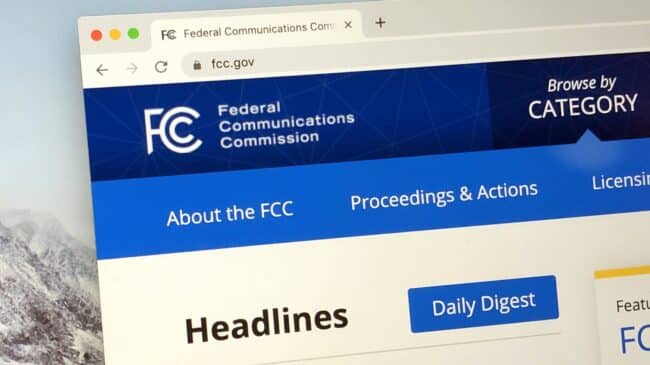Federal Communications Commission, et al.,
Petitioners,
v.
Consumers’ Research, et al.,
Respondents.
Schools, Health & Libraries Broadband Coalition, et al.,
Petitioners,
v.
Consumers’ Research, et al.,
Respondents.
Summary of argument
Respondents are correct on the bottom line, and so was the en banc Fifth Circuit: the administration of the Universal Service Fund (USF) Tax mechanism is unconstitutional. But the Fifth Circuit got it right for the wrong reason. The problem is not that the FCC’s reliance on the Universal Service Administrative Company (USAC) as administrator of the USF violates the “private nondelegation doctrine.” Rather, the problem is twofold: (1) The arrangement violates the Appointments Clause, because the USAC members can exercise significant governmental power under federal law without having gone through the proper appointment process. (2) The arrangement violates the Due Process Clause, because various members of USAC have an interest in the contribution amounts they project.
The Fifth Circuit was wrong that the FCC’s reliance on USAC violates the “private nondelegation doctrine.” There is no such doctrine. The idea that delegations of power to private parties are judged by a stricter standard than delegations to public parties has no support in any holdings of this Court. Any decisions that seem to the contrary have either been misinterpreted or were in fact based on other doctrines, like the Due Process Clause. And the lack of such a doctrine makes sense, because the nondelegation doctrine, which is rooted in Article I, is aimed at controlling Congress; it sensibly asks whether Congress has given up too much power, not who the recipient of such power is.
Assuming that the FCC is authorized to subdelegate to USAC, that subdelegation should be judged by the same standard as a subdelegation to a public body. (Amicus takes no position here on the statutory issue, or on whether the subdelegation to USAC would survive under the public-delegation standard.)
USAC exercises substantial federal power, because its projections go into effect automatically if the FCC does nothing within 14 days, and this determines the amount and distribution of the tax. This makes the members of USAC Officers of the United States. But because they weren’t appointed as Officers in the way that Article II requires, this arrangement violates the Appointments Clause.
That USAC members are nominally private is unimportant for Officer status. The labeling of USAC as private, and the fact that USAC is organized as a private organization under Delaware law, are constitutionally irrelevant, and in any event Appointments Clause doctrine doesn’t demand that an Officer formally be a public employee.
The Fifth Circuit was right to point out that there is a conflict of interest inherent in having USAC—which contains members of telecommunications companies, “who stand to benefit financially when universal service subsidies grow”—determine contribution amounts. Consumers’ Research v. FCC, 109 F.4th 743, 772 (5th Cir. 2024). But this problem should be located in the Due Process Clause, not in a private nondelegation doctrine. The Due Process Clause has for a century been interpreted to bar exercises of regulatory power by self-interested parties, whether public or private.
The distinction between the “private nondelegation doctrine,” the Appointments Clause, and the Due Process Clause, isn’t just of academic interest.
First, the doctrines are motivated by different theories. The nondelegation doctrine is giver-focused, asking whether Congress has given up too much power; the public-private question fits poorly with this concern. By contrast, the Appointments Clause is recipient-focused, asking, from a democratic accountability perspective, whether the recipient of major power has been validly authorized by the proper political process. And the Due Process Clause is application-focused, asking whether the use of the power implicates fairness concerns. The problem here fits more naturally with the Appointments Clause and Due Process issues.
Second, the doctrines apply in different contexts and have different remedies. For instance, a Due Process theory (unlike the nondelegation doctrine or the Appointments Clause) would apply even if this were a state regulatory scheme. It could also support damages under 42 U.S.C. § 1983 or Bivens v. Six Unknown Named Agents of Federal Bureau of Narcotics, 403 U.S. 388 (1971). And an Appointments Clause theory asks whether someone is “exercising significant authority pursuant to the laws of the United States.” Thus, an Appointments Clause approach will turn on how much power the agent exercises, ignoring trivial cases and requiring political accountability for significant ones. This is a sensible approach—otherwise, countless private delegations could be indiscriminately invalidated, from qui tam suits to private prison contracting to incorporation of private actuarial standards into healthcare regulation. Whether these are valid should depend on an inquiry into “significant authority.”
Third, a private nondelegation doctrine requires tough judgment calls about whether an organization is public or private, so the results will depend on the vagaries of public-private doctrines like the State Action Doctrine. (Indeed, it is not at all obvious that USAC is actually private here.) By contrast, the Appointments Clause and Due Process Clause depend on functional questions, such as whether significant power exists and whether there is a danger that it will be used self-interestedly. In today’s world of hybrid public-private organizations and nominally private organizations wielding coercive power, it makes more sense to rely on doctrines that do not hinge on formal public-private categorization.
Therefore, if this Court invalidates this regulatory scheme, it should do so on Due Process and/or Appointments Clause grounds. Regardless, this Court should not endorse any “private nondelegation doctrine” theory. (Amicus takes no position here on the ordinary nondelegation doctrine theory that the Fifth Circuit relied on to invalidate the initial delegation from Congress to the FCC. Amicus merely disagrees with the “private nondelegation doctrine.”)
Full Brief: Federal Communications Commission v. Consumers’ Research
